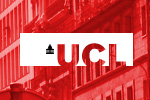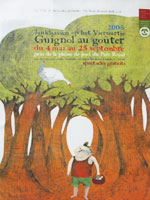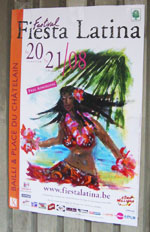

 |
 |
Language and integrationThe extent to which immigrants are ‘integrated’ is often measured by their knowledge of the official language(s), which is why integration or citizenship courses that are organised for newcomers, often contain a considerable amount of language acquisition. Implicitly, this means that policy makers hope that learning the language will partly encourage assimilation of values and norms. On the other hand, you could argue that learning the official language will literally give new citizens a voice to participate in society. language and the integration processMehmet Koksal, journalist “I was quite good at football, which made it slightly easier to be accepted. And when I also started to speak some Dutch, I was totally accepted. They told me; ‘Mehmet, you are a good one, if only all foreigners could be like you.’ They thought they were giving me a compliment, but it was actually insulting; it was like saying: ‘Karel, you are a very good Belgian, but that is quite exceptional in your community.’” from: Brussel Deze Week (13/04/2005) In the same way that speaking an official language can denote integration or even assimiliation, speaking a foreign language can emphasise otherness. This process is influenced by reactions and attitudes of both the local population and the immigrants.
Given the attitude of many Belgians, full assimilation is probably only possible for European groups. It is not unusual to hear a person of Turkish or Moroccan descent wonder about what it is they should do in order to be accepted; they speak the languages, take part in higher education, dress and behave like ‘Belgians’, but they are still regarded as ‘Moroccan’, ‘Turkish’ or ‘allochtonous’ in the first place. This case is an example of acculturation. The question remains whether assimilation is a desirable ideal and even though Brussels is already more pluralistic than any other Belgian city, complaints about ghettoisation (and hence segregation) around the city centre are rife.  “Miss Belgium with a tan”In 2005, it was the second time in history that Miss Belgium was of foreign descent. The first time was in 1992, when Sandra Joine won the crown. The honour was Tatiana Silva’s in 2005. Watch a report from celebrity programme De Rode Loper (VRT) [in Dutch], where both Misses meet and talk about their experiences and answer the following questions. Launch in external player question 14Which countries are the Misses’ families from? Do they feel strongly associated with their background? Do they still speak the languages of their families? >Answerquestion 15Do the girls suffer racism or discrimination? >Answermultiethnicity and ethnocentrismThe integration question is hard to answer because it assumes a homogeneous dominant culture and culturally homogeneous minority groups, who either do or don’t adjust. In reality, cultural groups are not very homogeneous and also, language groups are not necessarily cultural communities. For an example of the latter, think about the speakers of French in Brussels. In a migration city such as Brussels, there is a constant interaction, so it is impossible to talk of neatly delineated groups. Janssens (2001), for instance, concluded in his research that Islamic people in Brussels regard celebrations and family relations as very important, even though they mainly have a symbolic value, rather than a religious one. That is why they usually don’t have an issue with intercultural marriages, which is particularly the case for the younger generation. They claim they enjoy celebrating along with the older members of the family and value this, but they don’t necessarily attach much importance to religion. At the same time, they easily find their way in a western society. This is called multiethnism as they feel both Moroccan and Belgian. Whenever members of various groups consider living together with other cultures, problematic rather than enriching, when they are opposed to intercultural marriages and strongly emphasise family and sometimes also religion, this is called ethnocentrism. Other researchers define ethnocentrism as follows: “an unfavourable situation in terms of education, a lack of integration in social life, an individualistic stance, feelings of uncertainty and experiencing political powerlessness.” (Meuleman, Billiet 2002:161) Living in Brussels: Dominique Deruddere (47), filmmaker “When I used to go out in Antwerp, I was often singled out for my Limburg accent. That has never happened to me here, Brussels is just not provincial, thanks to the bilingualism. And why doesn’t Flanders want to see the great advantages of multiculturalism? A city where a person can imagine being in a different part of the world, isn’t that brilliant? If you live in Brussels and you feel at home there, you must be tolerant, I think, and you cannot vote >Belang. To make a fuss about nothing, to whinge about futilities – such as a foreigner leaning against someone else’s car – it is mostly Flemish immigrants who do this and more and more seem to be arriving. Still, the far right doesn’t really have a lot of support here, I think because the French speakers do use their some common sense and dig in their heels.” from: Brussel deze week, 07/04/2005 A striking conclusion from Janssens (2001:189) research is the attitude of Dutch speakers in Brussels, as they seem to be the strongest opponents of intercultural marriages as well as having more resentment towards the multicultural society than other groups, apart from the Turkish. The most open mind towards other groups can be found amongst second and third generation immigrants, who are mostly bilingual or multilingual. language and culture A rich cultural life with very diverse disciplines and backgrounds can be found in Brussels, which confirms the different communities’ backgrounds as well as being a discussion forum for other minorities. This cultural landscape is largely subsidised by the language communities (see >language and politics). The French as well as the Flemish communities support their own cultural centres, but there are also multilingual organisations, such as Bozar (@www.bozar.be) [Multilingual website of Bozar. Bozar organises cultural events in Brussels] that are sponsered by financial institutions and the media. Furthermore, there is the yearly zinnekeparade (@www.zinneke.org) [Website in French of the Brussels cultural project Zinneke], a very colourful parade through Brussels, which is supported by both language communities and the Brussels Capital Region. On the part of the minorities, there are all sorts of (inter)cultural organisations, theatre performances, radio and television stations in languages other than French or Dutch.  There are for instance several Turkish organisations with a focus on politics, such as the Kurdish ones. Furthermore, viewing and listening habits show a very diverse supply, as most inhabitants of foreign descent will keep on watching their national television stations via satellite, next to mainly French speaking Belgian and French channels. Most of them read French newspapers, Le Soir being the most popular, just as with all other Brussels inhabitants. Northern Europeans read most newspapers and next to French, about a quarter of them also reads English language publications. For the Turkish, the Turkish newspaper Hüriyet is very popular as is El Pais to a lesser extent for the Southern Europeans. French and bilingual people in Brussels mainly read French newspapers and even for the Dutch speakers, Le Soir comes first, followed by Het Laatste Nieuws and De Standaard. Janssens (2001:133) remarks that Turkish and Moroccan communities are not reached by regional or communal communications. On the other hand, it is remarkable that the ‘new’ bilinguals (French/other, non-Dutch language) visit libraries more often than other language groups. They prefer French works, followed by English, Dutch and Spanish ones. Then again, the local Belgian population visits theatres more often, with Dutch speakers attending both French and Dutch spoken performances. So while they also take part in French cultural life, this is less the case the other way around with very few French speakers attending Dutch events. Living in Brussels: Raven Ru╬ll, theatre person "For me, theatre should be an open space, where you can find a reflection of what is growing and brewing in a city. If you have been playing Othello for years with the same twelve actors, you can hardly claim to be doing well. This is why I think it is amazing that the KVS [Koninklijke Vlaams Schouwburg/Royal Flemish Theatre] organises several local projects, such as ‘Stoemp’, the Dito’Dito creation with Northern African youngsters from the area. Ten years ago, it would have been unthinkable to have Turks or Moroccans on the KVS stage, and now it is possible. To give the voiceless a voice, that is very important.” from: Brussel deze week, 23/07/2005 |